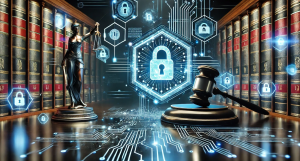In a world where a lawyer’s workflow is heavily dependent on digital technologies, security becomes critically important. Email, messengers, online registries, cloud services — all these are not just convenient tools but also potential ‘gateways’ for malicious actors.
Losing access to information or leaking confidential client data can have not only technical but also serious legal, financial, and reputational consequences for a lawyer.
Digital Threats: Real Risks for Lawyers
 Among the most common threats:
Among the most common threats:
-
cyberattacks (ransomware, DDoS, malware);
-
unauthorized account access;
-
data leaks through unprotected networks or device loss.
The legal consequences are evident:
-
disciplinary liability for disclosing attorney-client privilege;
-
financial losses and lawsuits from clients;
-
fines and system recovery costs;
-
most dangerously — reputation and client trust loss.
Phishing and Social Engineering: Attacking the Human Factor
Criminals are increasingly relying on psychology rather than ‘tech.’ Common methods include:
-
phishing emails with fake links or malicious attachments;
-
quishing — using QR codes to redirect to fraudulent resources;
-
vishing — phone calls impersonating authorities;
-
baiting — flash drives or ‘gifts’ with malware.
To minimize risks, a lawyer should have a clear action plan: avoid opening suspicious attachments, verify sender’s addresses, communicate with the sender through alternative channels, and report to IT professionals.
Email Protection
Email is a lawyer’s primary tool, but also the weakest link. Key rules:
-
always enable two-factor authentication (2FA);
-
regularly monitor account activity;
-
use spam filters and attachment scanners;
-
when in doubt, contact the administrator and keep evidence of the incident.
Browser and Passwords: First Line of Defense
The browser should not only be convenient but also secure: use anti-trackers, check for HTTPS, work in private mode on shared devices.
Passwords are the foundation.
-
at least 16 characters long;
-
unique for each service;
-
store them in password managers (KeePassXC, Bitwarden, 1Password);
-
regularly check for breaches through haveibeenpwned.com.
Device Security and Backup
Every work device should have:
-
antivirus and firewall;
-
clear separation of work and personal environments;
-
control access to external drives.
Equally important is backup. Combine cloud and local solutions, apply AES-256 encryption, and automate processes.
Public Wi-Fi Risks
Free Wi-Fi in a cafe can cost a lawyer dearly. Use VPN only, create your own hotspot from a phone, and turn off Wi-Fi when not needed.
Securing Messenger Accounts
Telegram, WhatsApp, Signal, or other messengers are a lawyer’s reality. However, remember:
-
each account should have a unique password;
-
mandatory 2FA;
-
regular audit of connected devices.
Conclusions
A lawyer’s digital security is not a one-time measure but a continuous process requiring discipline and vigilance. Strong passwords, multi-layered protection, regular software updates, and backup systems are fundamental steps without which modern legal practice is impossible.
Equally important is team training: even the most expensive technologies won’t help if a person becomes the ‘weak link.’ Therefore, digital literacy and attentiveness are not optional but mandatory conditions for preserving attorney-client privilege and client trust.
Source – https://tinyurl.com/2ppvr338



